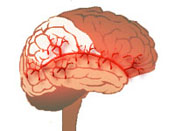Migraines Are More Than Just a Headache

March 18, 2016
It all starts with a stabbing pain in a small area behind one eye. Then it grows and grows until the pain is seeping down through the jaw and up through the top of the victim’s head, pulsating with every heartbeat. Hot and sharp, the pain wraps around, squeezing until even breathing no longer feels easy.
This is what a migraine feels like, and it is not as uncommon as some people may think. According to the U.S. National Library of Medicine, 25 percent of women will have a migraine at least once in their life, while 8 percent of 100 men will suffer from a migraine.
“It’s a sharp stabbing pain that feels like a jackhammer behind my eyes and the back of my head. I also get blurred vision, sore eyes, nausea, and bad vertigo, and am unable to eat for a few days,” said Haillee Hohns, 21 years old, a criminal justice/ forensics major at Mercy. “Typically the only moving around I do on a day that I have one is to the restroom and back and even then I stall until I really need to go.”
Searing pain is not the only symptom of a migraine. Migraines often start with “auras.” Auras are visual discrepancies that are often flashing lights or spots in visions. In addition to visual problems a sufferer may also experience severe light sensitivity and nausea as well as vomiting. Migraines can last anywhere from between a few hours to a few days and can result in hospitalization.
“The worst one I had was probably sophomore year of college. It felt like my head was going to explode and my medications weren’t helping. I couldn’t hold down any food either. It lasted a good two days,” says Hohns.
This is all very common for a migraine sufferer. Medications are often thought of as a miracle drug and sometime they just don’t work. Migraines are treated with various different types of medications. Some are easily available while others are not. The most commonly prescribed medications are over counter pain medications such as Advil, Aleve, and Excedrin. These medications may seem harmless but often cause more problems than actually helping. Migraine sufferers often take multiple doses of these medications daily in order to just function. Many sufferers need to even take double the amount of medication in one dose just for the medication to take effect because they often build a substantial tolerance towards the medication. In addition to building up a tolerance, sufferers can also develop rebound headaches from their own medication. A rebound headache is essentially a withdrawal reaction. The body becomes so used to having a medication to stop pain that when the medication wears off, the body causes pain in order to receive more medication. It then becomes a vicious cycle to avoid pain which causes the sufferer to take more medication which then increases their tolerance towards the medication causing the sufferer to need more just for some relief.
“I take Excedrin Extra Strength. Then, I wait an hour and try to do what I need to get done if I can,” Hohns explains.
Excedrin is one of the very common and effective medications the migraine sufferers turn to for relief. When taken often it can have disastrous effects on the body. This medication often causes sever liver damage over time as well as ulcers.
Migraines are still somewhat of a medical mystery. The exact reason as to why some suffer with them while others don’t is still unknown. What doctors do know is that the pain is caused by inflamed blood vessels on the brain. Disturbances in sleep cycles, stress, diet, exercise, and hereditary conditions are all believed to play a role for developing migraines. The cause as to why migraines happen is still unknown.
For those that suffer with migraines it’s a constant game of chance. Many worry as to when they are going to have a migraine.
“I stress about it sometimes. Especially if I haven’t had one in awhile,” says Hohns.
Not only does the sufferer have to worry about when the next migraine might strike they also have to worry about living everyday life.
“They can put me out of commission for a few days and it impacts plans I’ve made and school because then I rush to finish work that’s due,” says Hohns.
Like many other physical illnesses it causes sufferers to miss school and work.
“It shouldn’t cause someone to be penalized because it’s not something that can simply be stopped at the snap of a finger.”





